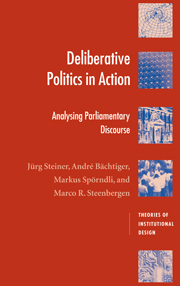Book contents
- Frontmatter
- Contents
- Acknowledgments
- Introduction: The research questions
- 1 Institutions and behavior: the example of consociational theory
- 2 The philosophical literature on deliberative politics
- 3 Measuring deliberation: a Discourse Quality Index
- 4 Understanding the real world of deliberation: hypotheses about antecedents and consequences
- 5 Antecedents of deliberation: institutions and issues
- 6 Discourse and its consequences
- Conclusion and research outlook
- Appendix: Discourse Quality Index (DQI): instructions for coders
- References
- Index
2 - The philosophical literature on deliberative politics
Published online by Cambridge University Press: 22 September 2009
- Frontmatter
- Contents
- Acknowledgments
- Introduction: The research questions
- 1 Institutions and behavior: the example of consociational theory
- 2 The philosophical literature on deliberative politics
- 3 Measuring deliberation: a Discourse Quality Index
- 4 Understanding the real world of deliberation: hypotheses about antecedents and consequences
- 5 Antecedents of deliberation: institutions and issues
- 6 Discourse and its consequences
- Conclusion and research outlook
- Appendix: Discourse Quality Index (DQI): instructions for coders
- References
- Index
Summary
The previous chapter left us with the challenge of how to conceptualize in a systematic way what consociational scholars call the spirit of accommodation. We have demonstrated on the basis of several empirical cases that the concept of the spirit of accommodation is too vague to be used in cross-national empirical research. We need a concept that goes beyond everyday language and is grounded systematically in a theoretical literature. We found such an anchor in the philosophical literature on deliberative politics. In this literature, a high deliberative quality has a very specific meaning. Of course, this meaning is somewhat differently defined from author to author. We base our project on the rationalistic argumentative version of authors such as Jürgen Habermas. This version corresponds best with the emphasis on rationality in most theories of institutionalism; we will develop this argument fully in chapter 4, where we will present the theoretical framework of how the quality of political deliberation can play a role in theories of institutionalism. Immersing ourselves in the literature on deliberation, our research interest has broadened from the narrower perspective of consociational theory to the larger questions of deliberative politics. In our thinking, consociational theory has become just one of many applications of the deliberative model.
Normative theories of deliberative politics
Instead of deliberative politics, one may also speak of discursive politics. We use the two terms as synonyms. The key for both terms is the dialogical aspect.
- Type
- Chapter
- Information
- Deliberative Politics in ActionAnalyzing Parliamentary Discourse, pp. 16 - 42Publisher: Cambridge University PressPrint publication year: 2005



